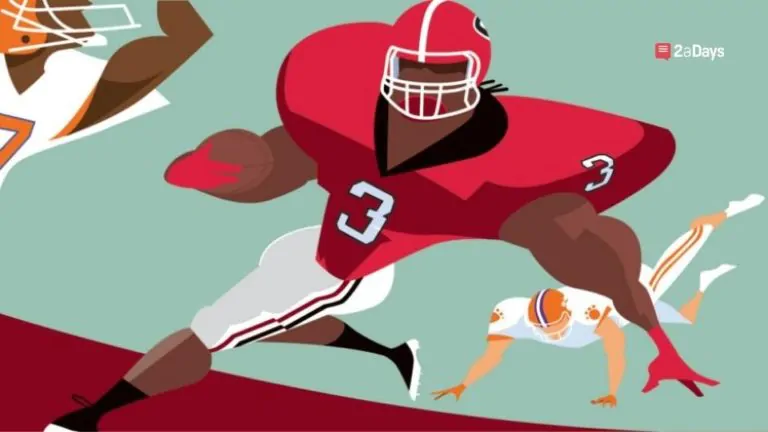Coach Melnitsky has been around the block when it comes to recruiting athletes to play college football. He has coached with the Trinity College Bantams for 17 seasons and during his tenure, has successfully recruited many Bantams to add to his rosters of talented athletes. The athletes Melnitsky recruits become just as successful as his veterans–Trinity paced the league with 38 total touchdowns and ranked No. 6 nationally in the red zone with points 91.4 percent of the time in 2016.
Needless to say, Coach Melnitsky has become very knowledgeable about college recruitment. So how does he evaluate prospects?
According to Melnitsky, coaches evaluate players in 3 main ways: recruiting services, meeting the recruit in person, and film. A recruiting service can promate players and there are plenty out there for players to choose from that help athletes build relationships with coaches and show them films of their clients. The next way coaches evaluate players is meeting players in person. Coach Melnitsky and other NESCAC coaches cannot meet players during the school visits. The only time they can meet recruits in person is during a campus visit or summer camp. A large part of a Division III coach's job is traveling to summer camps held by Division I schools. Finally, the third way Coach Melnitsky evaluates prospects is through film–coaches spend a lot of time evaluating players by watching highlight tapes.
How long should a highlight video be?
Coach Melnitsky believes less is more. A highlight tape should not be longer than 5 minutes–it is important to show the best plays first and only show the top plays. Coaches may only watch the first two minutes if they have a lot of film to go through.
Related: 5 Must-Do's For Your Football Highlight Tape (Plus 3 Things to Avoid)
What type of plays on film impress you when you are recruiting an offensive lineman?
Coaches will look at a prospect's film if they meet the physical specifications for the position. Coach Melnitski looks for tall and heavy offensive lineman who are developed athletes by their senior year of high school. An offensive line prospect should show their most explosive plays, where they put their full power on display. They are also looking for athletes that display a refined offensive lineman. This means they play aggressive (but not uncontrolled) and move well. An athlete that moves well plays with a low pad level and has control over their body. A large athlete like an offensive lineman that shows good body control is a valuable athlete for an offensive line coach.
Related: Rate your Coaches, Facilities, and Campus Visits
How important is an athlete showcasing their skills at a summer camp?
Coach Melnitski puts great value on seeing their recruits compete live. An athlete that attends camp will be measured. The weight, height, and strength of the athlete will be displayed to the coaches. In many cases, prospects are known to add an inch or so on their height or change their weight by a couple of pounds. Getting measurements at camp ensures that all of the athletes will show their true attributes.
Coaches value summer prospect camps because they can see them compete live against other prospects and can compare apples to apples. An athlete's highlight film might look good but the athlete might not play their best in-person or under pressure. Summer camps give coaches a chance to get a better look at recruits and sort out the good players and the players that only look good on film.
How do coaches communicate with players?
Back when Melnitski was a coach back in the 1990's, the main way to communicate with athletes was mostly through telephone calls and snail mail. Recruiting has since evolved in the modern day, and communicating with athletes is now easier than ever. Today, coaches typically communicate with athletes through texting, calling, and Twitter.
Related: 3 Email Tips For Recruits (and an Example Email to College Coaches)
What are some “red flags” for athletes when you recruit them?
Coach Melnitsky finds that the most common problem with recruits is a lack of consistent communication. Coaches that are interested in a recruit will communicate with them fairly frequently–around a couple of times a week–and a lack of communication or response on the recruit's side shows a lack of interest from the recruit. It is important to respond to coaches promptly.
Additionally, it is good for recruits to be honest with a coach during the recruiting process. It is always nice to tell the coach where they stand in the school rankings, even though it might be hard.
What are some advice for recruits communicating with their coach?
It is important to respond to coaches promptly. Answer and ask questions; Let the coaches know you're interested in being recruited. Also, every athlete looking to be recruited should have a Twitter account. A Twitter account is ubiquitous with college football recruiting.
Because coaches commonly contact athletes through Twitter, recruits should keep their Twitter account clean at all times; no posting inappropriate language or images. The athletes account should also be easy to find by their name–shortening it or using a nickname makes athletes hard to find.
Have an idea for a story or a question you need answered? Want to set up an interview with us? Email us at [email protected]
Image Credit: Twitter
* Originally published on April 3, 2023, by Ryan Wiley







